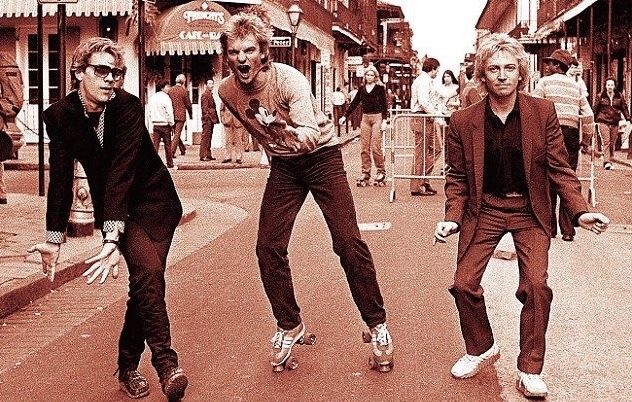
I can’t think of a single more uncool band emerging in the late ’70s to write about than the Police. Your mom probably really likes them. OR, if you were born in this millennium, then it’s more likely your grandma that really likes them and your mom likes, I don’t know, Blind Melon?
The undeniable truth about the Police is that they really are one-of-a-kind. Their direct influences (Bob Marley, the Beatles, Stevie Wonder, the Clash, to name a few) were so varied and culled from so delicately that they don’t really sound like anyone that came before them. Their mastery of blending styles is so offbeat and unique that they don’t really sound like anyone that came after them either. Sting and Stewart Copeland are as close to a Lennon/McCartney partnership as I can think of from the new wave scene, with both playing off each other well and reigning in the other’s worst impulses. Sorry Sting, I’m not listening to your vapid solo career anytime soon. And of course there was the third wheel Andy Summers, aka Ringo, who, like Ringo, is largely shoved aside but contributed nicely nonetheless.
The Police only put out five albums in six years and eventually called it quits, but it’s almost without chaff…as long as you don’t listen to Synchronicity. Spoiler alert on that, unpopular opinion ahead! Let’s dig in, shall we?
JUMP TO:
(1978) Outlandos d’Amour
(1979) Reggatta de Blanc
(1980) Zenyatta Mondatta
(1981) Ghost in the Machine
(1983) Synchronicity
Outlandos d’Amour (1978) – Rating: 8/10
Click Here for the Full Album Review

And to think it all began with some wimpy “punk” anthem. But hey, a banger is a banger, and “Next To You” kind of bangs. Great opener, I’m certainly hooked.
At the time, in 1978, the reviews for Outlandos d’Amour weren’t too positive. There were many accusations of “punk posturing”, not taking anything too seriously, lack of emotional sincerity, and general distaste for Sting’s vocals. I guess in this major transitional period for rock and roll it was rather tough to pin down exactly what, if anything, rock and roll needed to sound like anymore. Three white guys fusing reggae, rock, pop, and punk into a twisted amalgam? Who the fuck needed that? But, it turned out to be the band’s unique fingerprint, and here we are.
I like this first album MUCH better than Synchronicity, which might be an uncommon opinion because of, you know, maturity I suppose. With a couple of exceptions it’s a tight debut. I don’t like the spoken word blowup doll interlude on “Be My Girl, Sally”, which completely ruins an otherwise catchy song. I don’t like the entirety of “Born in the ’50s” because the bombast is incredibly dated and sad now (“We’re taking the future/We don’t need no teacher!“). Nice “fuck you, old man” anthem, boomers. That really aged well.
In short, if Sting’s melodies and bass are what you think of first when you think of the Police, then I’m crediting Copeland entirely for Outlandos d’Amour‘s playful and silly energy. I love Copeland, I love this album. Summers, though, can take a hike!
This is the album with “Roxanne” on it, the most tasteful ode to a prostitute ever recorded.
Reggatta de Blanc (1979) – Rating: 10/10
No Full Album Review Yet
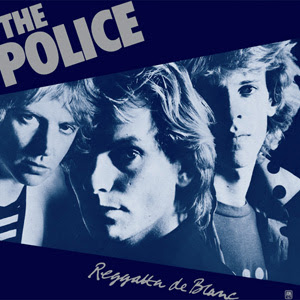
Even better! This sounds more like the Police that we all (me) know and love. Reggatta de Blanc is a really good album, guys, I swear. I know it’s not cool to like the Police at all in 2021 if you’re younger than 55, but please consider spinning this at least once between your St. Vincents and your Mac Millers and your Janelle Monaes and your Ed Sheerans. Guys?…
Seriously, though, perfect 10. No filler, no duds, no ruined songs with sex doll poetry. I feel like this is also the most diverse of their five albums with respect to both style and mood, and the track sequencing helps here by mostly alternating the high-tempo cuts and the low-tempo cuts. New experiments with complex sonic textures from the addition of a synthesizer are successful at rounding out the sound. What I like most is that the fusion of the pop, reggae, rock, and new wave is even more homogenized this time, mixed thoroughly into this cohesive stew that sounds like no one else in 1979 or since. Personal favorites include the irresistible chorus and unmatched energy from “It’s Alright for You”, Copeland’s hi-hat magic on “Walking on the Moon”, the uneasy, tense guitar and bass on “Contact”, the awesomely upbeat, layered melodies of “Deathwish” (so layered, in fact, that it seems impossible that they were able to put vocals to it), and the entirety of “On Any Other Day” which is pure Copeland dumb fun (the kind you’d hear a lot more from his solo Klark Kent output).
It’s all good. Listen to it. This is the album with “Message in a Bottle” on it, which teaches us that you’re not alone at feeling alone. Hmm? Ah? Hmm! Ah.
Zenyatta Mondatta (1980) – Rating: 9/10
No Full Album Review Yet
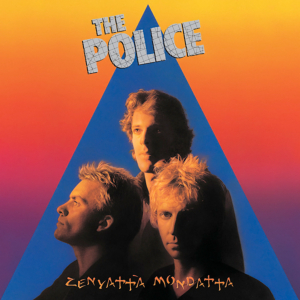
Still great, but we already hit our peak as far as I’m concerned. It’s very clear by now that they’ve moved on from anything adjacent to punk. A lot of this record is more relaxed than before, with greater emphasis on the reggae rhythms and driving basslines. The tempos are slower on average, giving the tracks room to breathe in order to suck you into their hypnotic grooves.
At the surface level, the star here is the bass. Lead guitar is relegated to the background, acting as a secondary rhythm guitar to contribute ambiance and not much more. But, as much as Sting managed to command status as the de facto leader of the band in the perception of the public, Zenyatta Mondatta was truly Copeland’s moment, there’s no better representation of his strong rhythmic sensibilities. Copeland is so good at rhythm that you don’t need melody. “Bombs Away” is one of my favorite Police songs, and to me it’s Copeland’s opus. Sting’s vocal contributions are just the icing on the cake, but I think Copeland should’ve sung it. Anyway, yada yada, I’m a Copeland fanboy. The Spyro the Dragon soundtrack, after all, was very influential to my taste in music.
And speaking of Spyro, if you’re familiar with the music of the original trilogy of Playstation games then you’ll hear a lot of similarities in the music of Zenyatta Mondatta if you listen closely. A lot of these fanciful little ambient fills are present and adds a little special touch to their music.
Why not a perfect 10? I dunno, I’m not feeling it. There are two instrumentals that feel like throwaways: “Behind My Camel” is fine, but I can’t help but feel like it sounds like a leftover scrap from David Bowie’s Low album three years earlier, and the closer “The Other Way of Stopping” is just plain anticlimactic. The penultimate track “Shadows in the Rain” as a lead-in the anticlimactic closer doesn’t help either, because it’s a little too listless for my tastes and it runs a little too long.
Some of the best tracks in the Police catalogue are on this album, though, which offsets the minor problems. This is the album with “Don’t Stand So Close To Me”, which is a WAY more relevant sentiment in 2021 than it was in 1980. Who are these people, the Covid Police? Ha!
Ghost in the Machine (1981) – Rating: 7/10
No Full Album Review Yet
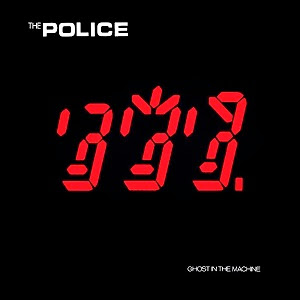
STILL good, but ’80s cheese is starting to permeate the sound a little more than I’d expect from these smart young, strapping gentlemen. It’s getting a little more synth heavy and a little more poppy and a little less funky at times.
I’m going to come out and say it right now, that both the first two tracks and the last two tracks are not the kind of Police that appeals to me. This is the album with “Every Little Thing She Does Is Magic” on it, and I don’t like it! Maybe it’s the wrong combination of overplayed, joyful, and literal. And for a love song that shit bites! All four of these bookend tracks tread too close to the dreaded aDuLt cOnTeMpOrArY that I don’t want to touch with a 10-foot dick pole, and hearing that soft rock flavor from the first two tracks in a row scares me a little before we get to the good stuff and I can let my dang guard down.
But yes, fortunately, things pick up in the middle in a very good way, and the entire run from “Hungry For You” through “Rehumanize Yourself” is immaculately catchy and fun and without too much cheese. And I didn’t know Sting could wail on the sax! He does it all over the place, adding some texture to the dance-y rhythms.
So, gonna have to take the good with the not-so-good. I’m lukewarm about this one, but at least Sting says “cunts” with vitriol while fascist-bashing during “Rehumanize Yourself” so I can’t take too many points away, can I?
Synchronicity (1983) – Rating: 4/10
No Full Album Review Yet
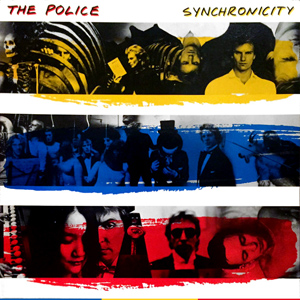
It’s ok at best, but they lost me here for the most part. All the easy listening adult contemporary pap is now hard to hide, and the meager number of truly interesting or exciting tracks has plummeted to three: “Mother”, “Miss Gradenko”, and “Synchronicity II”. “Mother” is the most experimental the band ever got, and if you haven’t yet recovered from Andy Summers’ blowup doll sex poetry from Outlandos d’Amour then you’re in for a real treat here with his mother sex poetry! “Miss Gradenko” is more of Stewart Copeland’s trademark rhythmic bliss. “Synchronicity II” you already know as an oft-played terrestrial radio hit, but it’s an exciting pop number.
The rest of the songs I could do without, plain and simple. The early tracks have a lot of that cloying and corny synthy worldbeat influence. This is the album with “Every Breath You Take” on it, which is the single WORST Police song ever recorded for reasons I’ll flesh out some day for 4,000 words in a full Synchronicity album review. The other big hit “King of Pain” sucks almost as much. These two songs just a soft chunks of phony sentimentality, the kind that presents Sting at his most obnoxious, the kind of stuff that his solo career is built on. Yuck.
I simply don’t get the appeal of this album. It’s just not for me, I guess. Maybe I have to have been BOOOORRRRNNN! BORN IN THE FIIIIIFFFFTIES!! Right fellas? Huh? Bleh.






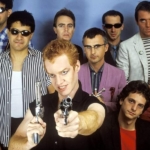
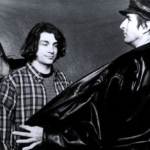
Click here to ridicule this post!